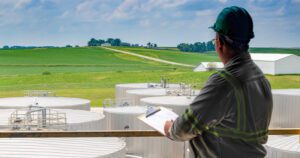By Scott Fenwick, Technical Director, Clean Fuels Alliance America
Published in SIGMA IGM Magazine’s July/August 2023 Issue
Biodiesel isn’t a substitute for diesel fuel; it’s an upgrade. Biodiesel adds lubricity to an engine, eliminating the need for a fuel additive. It lowers particulate matter, hydrocarbons, CO2 emissions and greenhouse gases. It’s non-hazardous, biodegradable and non-toxic. It’s helping fleets quickly meet carbon reduction goals in hard-to-electrify, heavy-duty vehicles. The benefits are apparent, but newcomers often want to know whether it works. Changing fuels in your most expensive vehicles is a high-stakes decision. However, mounds of data show that in today’s diesel engines, biodiesel works at B20 (a blend of 20% biodiesel with 80% diesel), and even higher blends. It’s even been tested and works in engines that won’t be on the market until five to ten years from now.
At Clean Fuels Alliance America (formerly the National Biodiesel Board), we’re constantly putting biodiesel to the test because we want people to know what we know: that biodiesel is a high-quality fuel. Throughout its 30-year history, the biodiesel industry and Clean Fuels have proactively led cooperative research projects with original equipment manufacturers (OEMs) and leading research institutions to determine if the ASTM specifications for B100 needed to be modified to ensure that biodiesel blends will perform reliably and effectively when diesel fuel or diesel engine regulations change.
Based on compelling new biodiesel fuel quality data from some of the nation’s top research institutions, ASTM International has published a new Low Metals (LM) grade of biodiesel in D6751, the ASTM specification for low-carbon B100 biodiesel used as a blendstock with middle distillate fuels such as diesel
fuel.
The latest round of research tested the impacts of B20 on the long-term durability of diesel particulate filters in New Technology Diesel Engines (NTDEs) outfitted with modern Selective Catalytic Reduction (SCR) and Diesel Particulate Filter (DPF) aftertreatment.
This study was conducted with Southwest Research Institute and the National Renewable Energy Laboratory in a large, multi-year cooperative program with diesel engine and exhaust aftertreatment manufacturers. The testing compared long-term (over 1,000 hours of accelerated aging) impacts of NTDEs running on B20 with a lower level of metals – equivalent to B100 containing a total of 4 parts per million (ppm) for sodium (Na), potassium (K), calcium (Ca) and magnesium (Mg) – to the impacts of conventional ultra-low sulfur diesel (ULSD).
The results indicated that biodiesel containing a maximum of 4 ppm total metals resulted in ash that was similar to that deposited by the ULSD, exhibited a similar ash cleaning removal efficiency, did not have a negative effect on DPF pressure drop or regeneration rates, and did not appear to have any deleterious physical effects on the DPF substrate. These studies were presented at the SAE Congress in Detroit in April 2023 and published as SAE Papers 2023-01-0297 and 2023-01-0296. The work was instrumental in the passage of a successful ballot by the ASTM D02 Fuels Committee to approve a new LM grade of ASTM D6751 biodiesel with a maximum of 4 ppm total metals (Na+K+Ca+Mg), down from the existing grades which allow up to 10 ppm total metals.
The biodiesel fuel quality report published by the National Renewable Energy Lab (NREL) is a final contributing factor to the persuasive technical data required to tighten ASTM specifications. Now in its sixth year, this annual report documents the quality of biodiesel produced in the United States and Canada by BQ-9000 certified producers, which represent over 90% of North American production. According to the most recent NREL report from June 2023, the current average of B100 total metals in the marketplace today registers below 1 ppm total, well below the 4 ppm specification recently adopted in the new LM grade of biodiesel at ASTM.
The rigor of these cooperative research efforts and the positive results, along with the already low level of metals in commercial production in the field, bode well for biodiesel use in the new Ultra-Low Emissions Diesel Engines (ULEDE) coming to market in 2027-2031.
As ASTM International celebrates its 125th anniversary this year, it has chosen the ASTM D6751 specification for biodiesel as one of the Top 10 most influential standards that ASTM has ever produced. This specification has ensured that biodiesel is held to a higher standard than petroleum diesel, meaning that as long as fuel meets the specs, it will perform throughout an engine’s full life.
The new standard will continue to bolster confidence in the fuel for OEMs and fleets, providing further evidence that biodiesel is a high-quality fuel, continually improving, and meeting robust quality standards.
That confidence is essential because as emissions standards tighten and corporations increase pledges to reduce their carbon footprint, fleets require immediate solutions. Consumers and regulators are demanding greener practices, and biodiesel is rising to meet that demand.
The pressure is on. There may be a day when companies have traded their diesel semi-trucks for expensive electric models and figured out how to keep them charged as they ship goods across the country, but these companies can’t wait a decade or longer for heavy-duty electrification to be optimized and tested—they need solutions today.
Biodiesel is available as a high-quality drop-in fuel. It is becoming the obvious or, in many cases, the only choice. Biodiesel is shifting from a luxury item for a few environmentally conscious fleets to a necessity for corporations to compete in the modern world.
New research and tighter specifications are important pieces in making fleets feel comfortable with that choice. Clean Fuels will continue to work closely with ASTM International, OEMs, and leading research institutions to ensure that B20 and higher biodiesel blends continue to offer fleets an easy, reliable, and sustainable decarbonization solution now and for decades to come.
We have rigorous data to ensure that B20 can perform in any diesel engine and any application, whether that be highway, ag, marine, rail, heating oil, or power generation. Engine manufacturers and fleets should be confident that biodiesel is fit for purpose in the diesel engines of yesterday, today, and tomorrow and will have only positive impacts on performance and durability.
The data shows time and time again that fleets can have it all. They can meet emissions goals while filling up with reliable, high-quality fuel. Biodiesel has become a premium product that solves the challenges of today’s fleets. Clean Fuels Alliance America will continue to work with OEMs and biodiesel producers to ensure our fuel continually improves and exceeds the demands of heavy-duty engines.
This article was funded by the United Soybean Board and state checkoff organizations.
ABOUT CLEAN FUELS ALLIANCE AMERICA
Made from an increasingly diverse mix of resources such as recycled cooking oil, soybean oil, and animal fats, the clean fuels industry is a proven, integral part of America’s clean energy future. Clean Fuels Alliance America is the U.S. trade association representing the entire biodiesel, renewable diesel and sustainable aviation fuel supply chain, including producers, feedstock suppliers and fuel distributors. Clean Fuels receives funding from a broad mix of private companies and associations, including the United Soybean Board and state checkoff organizations.




